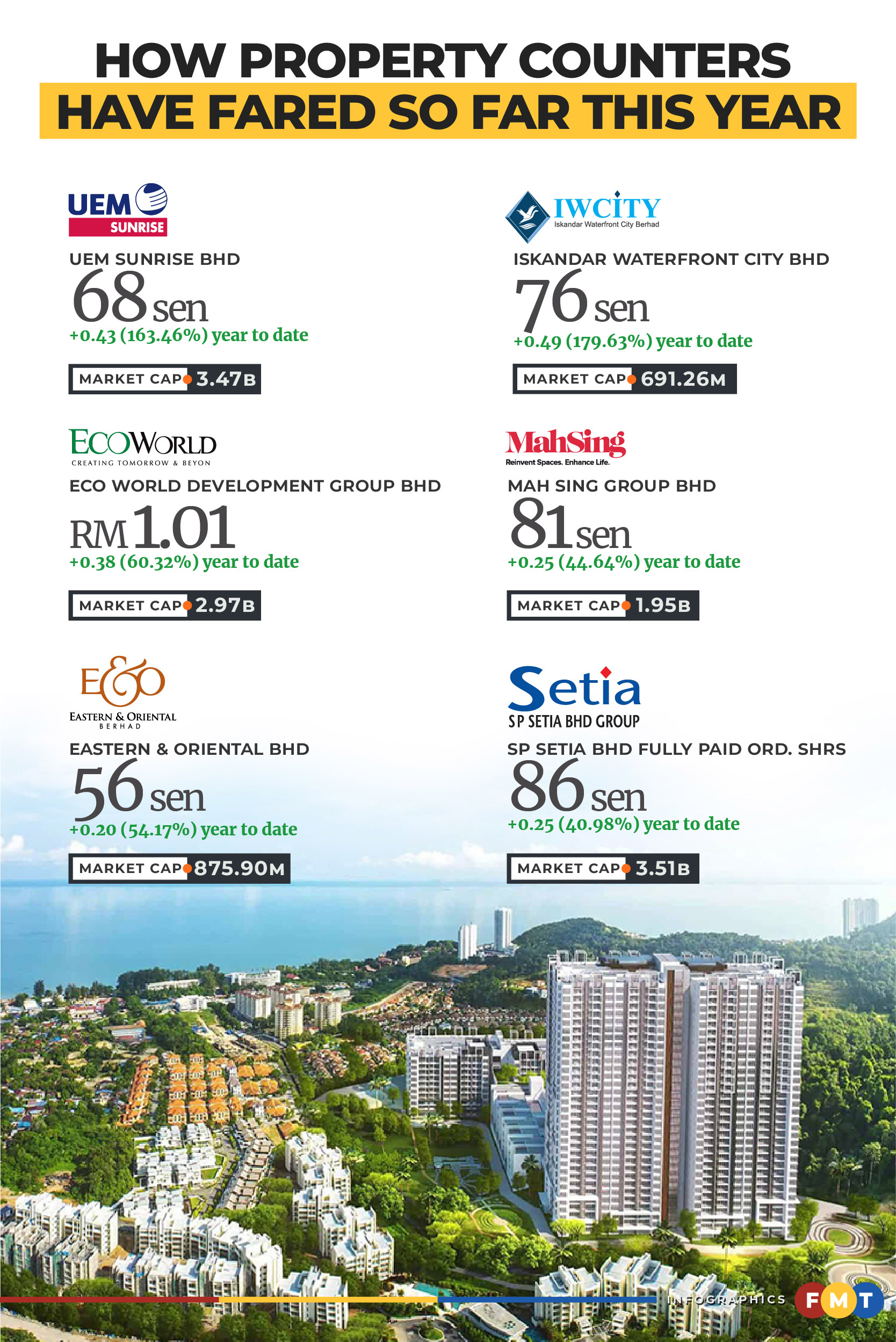
PETALING JAYA: In an environment where rising interest rates have led to falling demand, thereby weakening market sentiment, property and construction counters on Bursa Malaysia have done remarkably well.
For instance, share prices of UEM Sunrise Bhd, Iskandar Waterfront City Bhd and Eco World Development Group Bhd have returned to pre-Covid highs.
UEM Sunrise stocks have surged 163.46% since the start of the year to close at 68 sen yesterday while that of Iskandar Waterfront has risen 179.63% year-to-date (YTD) to 76 sen. Meanwhile, Eco World’s share price has chalked up a 60.32% gain to RM1.01 in the same period.
Analysts have attributed the revival in interest in these counters to announcements of new infrastructure projects.
For instance, the government has announced plans for a new financial centre in the Forest City development near Johor’s Iskandar Malaysia project.
Research house EMIR Research CEO Rais Hussin said the broader market gains are in line with this announcement.

“Since early July, the property index has seen a 27.2% gain, markedly outperforming the benchmark FTSE Bursa Malaysia KLCI (FBM KLCI), which rose 6.3% in the same period,” Rais said.
However, it must be noted that these counters also started from a low base. The market value to price-to-book (P/B) ratio has been at a historic low thanks to successive increases in the overnight policy rate (OPR) and back-to-back lockdowns during the Covid-19 pandemic.
But other dynamics are also at play. For instance, the mortgage sector revival in China, led by the easing of rules for first-time home buyers, has boosted market sentiments.
Spillover from China
First-time home buyers in Beijing and Shanghai will now be given preferential mortgage rates regardless of their credit history, making them eligible for smaller downpayment.
“The revival of the mortgage sector in China has had some positive spillover effects directly and indirectly in Malaysia,” Rais told FMT Business.
“The measure is expected to boost domestic consumption in China, its leading driver of growth, thus countering the sluggish export performance,” he added.
Indirectly, he said, the easing of rules, together with the cut in interest rates, could boost interest in properties abroad, including Malaysia.
Construction sector still in slumber
Overall, many analysts believe there has not been much activity yet in the sector.
Thong Pak Leng, vice-president of research at Rakuten Trade Sdn Bhd, said property stocks are just riding on the overall market improvement.
“Property stocks have been trading at a P/BV (price to book value) of 0.3 to 0.6 times over the past five to six years. They are undervalued anyway,” he told FMT Business.
Public Investment Bank equity junior analyst Avery Chin believes investors are buying on news flows. “I do not foresee meaningful impact in terms of job flow to the construction sector yet,” she told FMT Business.
“The property market slowed down in the second quarter. Sales momentum for low to mid-range houses would probably continue but not so for mid-to-high-range products,” she said, adding that developers are holding back launches as demand for this segment has softened.
“We are still waiting for the rollout of big projects such as MRT3, Penang LRT, SARP, PIA expansion and road projects in East Malaysia in order to see meaningful pick-up in earnings in the construction sector,” she said.
However, Chin said, developers with exposure in Johor, especially the special economic zone, have seen “quite a good rally” despite the locations of their projects.
“Matrix Concept Holdings Bhd and UEM Sunrise have performed exceptionally well due to news flow on the high speed rail (HSR),” she added.
Bad times not over yet
Be that as it may, in the real economy, the property and construction sector, like most sectors, is experiencing a slowdown, Rais said.
For instance, he said, the Valuation and Property Services Department has reported a drop in business and consumer confidence. The market shrank 5.7% in the first quarter (Q1 2023) on interest rate hikes.
“Based on anecdotal evidence, many smaller companies are experiencing tight cashflow and have resorted to selling their capital assets instead of taking more (external) debt on the expectation of low sales and profitability,” he added.
Rais attributed this to the fact that the “demand price” for capital assets has dropped below their “supply price” on expectations of an uncertainty or economic slowdown.
Apart from that, political stability and clearer macroeconomic directions were also critical factors that have helped to boost the property counters, he added. - FMT



No comments:
Post a Comment
Note: Only a member of this blog may post a comment.